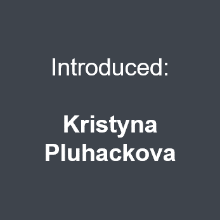The newest addition to SimTech is Junior Research Group Leader Kristyna Pluhackova who joined SimTech in January. In order to get to know her better, please find below a short interview.
Maybe you can introduce yourself briefly. Where do you come from? What have you done so far?
By background, I am a quantum chemist from Prague, Czech Republic. During my research at the Czech Academy of Sciences, I have become fascinated by biological questions and problems. Therefore, I did my PhD in the Computational Biology group of Prof. Rainer Böckmann in Erlangen, Germany, where I developed and applied methods for molecular dynamic simulations of biomembranes. After an additional year as an independent young researcher in Erlangen, studying G protein-coupled receptors, I moved to the ETH Zürich in Basel, Switzerland, where I complemented atomic force microscopy experiments performed in the Biophysics group of Prof. Daniel Müller.
What are your plans and goals as a junior research group leader?
Over the last 4 years, I already had the opportunity to prove my scientific independence and ability to acquire computer time on (inter)national high-performance computer clusters and to establish and maintain international collaborations. Adding to this, in SimTech I will carry the responsibility for my students and will be in charge for acquiring and handling 3rd party funding and our group budget. It is a very exciting step and I am very happy that I have found a PhD student who wants to support me in gaining all these new competences and experiences and fine-tune my group leader skills in open discussions.
A certain disadvantage of the junior group leader position at SimTech, compared to junior professorships or for example the Emmy-Noether fellowship, is its limitation to 4 years. On the other hand, I am not obliged to teach. So, I can first concentrate on establishing my research group, acquiring 3rd party funding and only then I will start preparing a lecture and practical courses on a topic of my choice. All in all, I am looking for a creative, scientifically productive time in a stimulating and supportive environment. I am thrilled to have my own group and enough time for both science and my students.
Which will be your main topics in SimTech?
The biological systems I studied over the recent years have revealed to me that molecular dynamics (MD) simulations lag behind the experiments and reality in many aspects. In SimTech I will have the unique opportunity to improve MD simulation techniques in order to achieve a more realistic description of biological systems. In detail, my group will develop membrane models of natural lipid composition, we will prepare and use parameters for post-translational modifications, and we will tackle spontaneous protonation in classical MD. Moreover, we will use machine learning to establish a user-friendly resolution conversion methodology. By sharing the parameters and the simulation protocols and tutorials with the scientific community, we aim to increase the awareness on the importance of proton exchange, membrane composition, and post-translational modifications in biological processes, and lower the barrier for their usage in typical MD simulations.
What do you expect from the cooperation with and within SimTech?
My group will synergistically profit from the experience of SimTech scientists in simulations and machine learning on one hand and establish collaborations with experimental colleagues at the University of Stuttgart on the other hand. Moreover, we will strongly profit from the local, regional and national computational infrastructure, because molecular dynamics simulations are extreme consumers of computational resources.
Do you have any open positions to fill?
Yes, I have open positions for Bachelor and Master students that can be started immediately and can be done remotely. This is a real advantage of being a theoretician: you need a computer and an internet connection. The simulations themselves are done remotely on (inter)national or regional high-performance computer clusters. The first PhD student of mine has already started on January 1st, the next PhD positions are hopefully to come during the year. Therefore, hereby, I invite interested students to drop me an email.
Have you ever been to Stuttgart? Do you know the city?
Frankly speaking, I know only the main railway station. Both from the newspapers (Stuttgart21) and from inside during some rapid train transfers when D-Bahn had been "creative" again. Due to Corona, I did not have a chance to see the University or the town during the job interview or afterwards. Everything has been virtual so far. It feels all a bit weird; we are living in crazy times. But I have heard that the Vaihingen Campus is very nice and green and that the forests in the surroundings of Stuttgart are MTB-friendly, so I am looking forward to rock my MTB there.
What did you want to become as a kid?
As typical for a little Czech girl ;) I wanted to be a fighter pilot. This dream has died, to a huge relief of my mother, when I got glasses at the age of 10 or so. Then I was not sure until the age of 15, when I have discovered that I want to become a scientist, and this dream I have resolutely followed since then.
Quickly asked
Movie or book? Book or an audiobook
Mountains or beach? Mountains!
Coffee or tea? Un caffè doppio, per favore
Watch sports or do sports? Do sports!
Car or bike? Bike until 30km and 50km/h. Then car ;)
Cat or dog? Dog, but currently we "have" only a squirrel and a green woodpecker living on and in the facade of our house.
Cinema or concert? Neither.
Early riser or night owl? Night owl but only until midnight.


